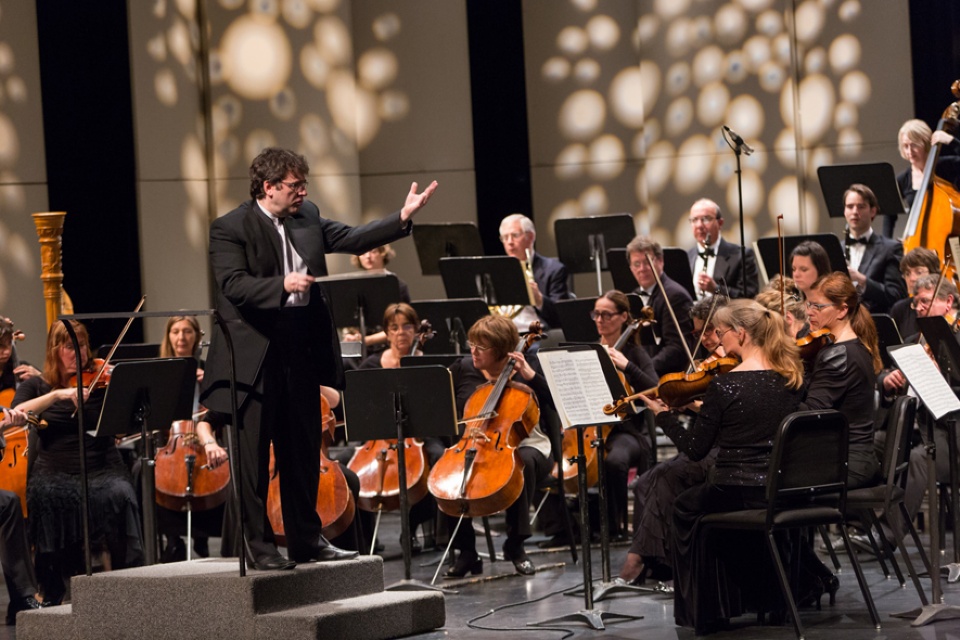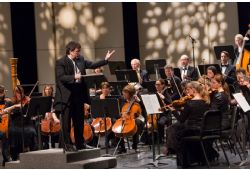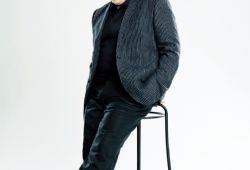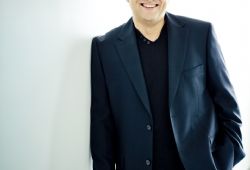"Wayne
Gretzky, was arguably the best hockey player ever..." Alain Trudel the
critically acclaimed trombonist and musical director of L'Orchestre Symphonique
de Laval paused for dramatic effect before adding, “after Mario Lemieux."
Everyone at the table, including Trudel, broke out into laughter.
The
internationally celebrated musician, composer, and conductor was employing a
hockey analogy to answer a question about a musician's skill set and how it
translates into an ability to conduct and manage a symphony. "Gretzky was
a great player, but look what happened when he coached the Coyotes. What a
disaster! Clearly playing and coaching are different jobs. But I don't
think Jacques Demers was the best skater ever."
Demers,
who coached the bleu blanc et rouge
to their last Stanley Cup in 1993, is one of Trudel's idols. "The two
professions are much the same... coaching and conducting are both about managing
human resources. My job is to build the proper context for the musicians to succeed...
much like Demers and the Canadiens. Sometimes a person has a skill set for a
leadership role; sometimes it's about being a soloist. I have a skill set that
fits a little bit of both."
While
talking to the renowned trombonist and conductor who has appeared at the helm
of both major Canadian and international orchestras, it becomes quickly evident
that the maestro is more interested in contributing positively to his community
than receiving accolades. During the interview, Trudel spoke passionately about
the three pillars that L’Orchestra Symphonque de Laval's is built upon;
community, excellence and education. "I see the orchestra as a citizen of
our city and surrounding community. We want to provide a service that reaches
as many people as possible."
As he
described the orchestra's role within the community, the musical director spoke
in a tenor that resonated with hope and enthusiasm, insisting that one of his
goals is to change the perceptions that the public has regarding the publicly
funded orchestra. "I don't want us to be seen as a luxury good designed
solely for the pleasure of the elite; I see our symphony as a community
service that is meant to be accessible to everyone."
When
asked to elaborate on how the symphony's three pillars translate into greater
accessibility, Trudel didn't miss a beat. "Right now, as we speak, our
composer in residence, Nicholas Gilbert, is writing a musical score with a
bunch of kids at the Cosmodome." Trudel beamed as he described an ongoing
enterprise that involves students actively composing music that will be
premiered by the orchestra.
A
concert on February 17th that features a performance of British composer,
Gustav Holst's critically acclaimed The Planets, as well as John
William’s celebrated soundtrack to the movie Star Wars, will also
include the score about space that Gilbert and the children at the Cosmodome
are collaborating on.
Trudel
insisted that inspiring teenagers is important to him. “That is why we have
been sending out our composers in residence to schools so they can work with
young people. By writing music together, we open their minds to creation.”
It's
not just innovations with schools and young people that make L’Orchestre
Symphonique de Laval such an engaged part of the community. On December 2nd,
the orchestra paid tribute to Laval's own Dr. François Reeves, a cardiologist
at the Cité-de-la-Santé and author of Planète Coeur. The evening
was titled Music of the Heart and is part of an ongoing series
of events that pay homage to exceptional citizens of Laval.
To
ensure that the orchestra continues to be accessible to the community, Trudel
has also introduced the Music, Maestro! Memoria Series, which takes
place on Wednesday afternoons at 1;30, four times a year. The 70-minute program
provides a dynamic opportunity to get up close and personal with the orchestra,
or as Trudel likes to describe it, an invitation into the orchestra's kitchen.
The
afternoon run-through provides the audience with a glimpse of the orchestra as
the finishing touches are finalized for the evening performance. The conductor
wears a wireless mic, and the audience is welcome into Trudel's galley. “It's
like a cooking show where the host talks you through the creation of a
wonderful dish. I believe that at the evening performance, the experience is
akin to visiting a wonderful restaurant where you have a great meal. And
although the chef may come out and talk to you about his creation, he will never
reveal the secrets that you might have discovered had you come to the afternoon
show and taken a peak into our kitchen.”
Throughout
the interview, Trudel returned to the theme of community spirit and how that
drive for excellence begins with the way that the orchestra is being perceived.
When asked to articulate about the origins of his grassroots ideology, Trudel
smiled and reflected upon his youth. “I came from a very humble family... it
was just my mom and me. She was a single mom, we were on welfare, and we were
very poor.”
Although both of his parents were jazz
musicians, he insists that he would have never learned to play an instrument if
it wasn't for a community-based band, Les Rhythmique, where brass
and percussion instruments were taught for free. “It was run by volunteers;
there was a police officer, a man who owned a trophy engraving shop, another
who had an ice cream parlour. They had this profound love for music and a
desire to do something positive for kids. So that commitment to community is
engrained in my DNA.”

 In The Latest Issue:Latest Issue:
In The Latest Issue:Latest Issue:
- A Bittersweet Farewell
- The new Laval Aquatic Co...
- The End of an Era:
Articles
Calendar
Virtual- ANNUAL TEACHER APPRECIATION CONTEST
- APPUI LAVAL
- ARTS & CULTURE
- CAMPS
- CAR GUIDE
- CCIL
- CENTENNIAL ACADEMY
- CHARITY FUNDRAISING
- CITYTV
- COSMODÔME
- COMMUNITY CONNECTIONS
- COVER STORY
- DINA DIMITRATOS
- ÉCOLE SUPÉRIEURE DE BALLET DU QUÉBEC
- EDITORIALS
- ÉDUCALOI
- EDUCATION
- EMPLOYMENT & ENTREPRENEURSHIP
- FÊTE DE LA FAMILLE
- FÊTE DU QUARTIER SAINT-BRUNO
- FAMILIES
- FESTIVAL LAVAL LAUGHS
- FÊTE DE QUARTIER VAL-DES-BRISES
- FINANCES
- GLI CUMBARE
- GROUPE RENO-EXPERT
- HEALTH & WELL-BEING
- 30 MINUTE HIT
- ANXIETY
- CHILDREN`S HEALTH & WELLNESS
- CLOSE AID
- DENTAL WELLNESS
- EXTREME EVOLUTION SPORTS CENTRE
- FONDATION CITÉ DE LA SANTÉ
- GENERAL
- HEARING HEALTH
- MESSAGES FROM THE HEALTH AGENCY OF CANADA
- MENTAL HEALTH
- SEXUALITY
- SOCIAL INTEGRATION
- SPECIAL NEEDS
- TEENS
- THE NUTRITION CORNER
- THE NUTRITION CORNER - RECIPES
- VACATION DESTINATION
- WOMEN'S FITNESS
- WOMEN'S HEALTH
- HILTON MONTREAL/LAVAL
- HOME & GARDEN
- INTERNATIONAL WOMEN'S DAY
- JAGUAR LAVAL
- LAVAL À VÉLO
- LAVAL FAMILIES TV SHOW
- LAVAL FAMILIES MAGAZINE CARES
- LAVAL URBAN IN NATURE
- LE PARCOURS DES HÉROS
- LES PETITS GOURMETS DANS MA COUR
- LEON'S FURNITURE
- LEONARDO DA VINCI CENTRE
- LFM PREMIERES
- LIFE BALANCE
- M.P. PROFILE
- MISS EDGAR'S AND MISS CRAMP'S SCHOOL
- MISSING CHILDREN'S NETWORK
- NETFOLIE
- NORTH STAR ACADEMY LAVAL
- OUTFRONT MEDIA
- PASSION SOCCER
- PARC DE LA RIVIÈRE-DES-MILLE-ÎLES
- PÂTISSERIE ST-MARTIN
- PIZZERIA LÌOLÀ
- PLACE BELL
- PORTRAITS OF YOUR MNA'S
- ROCKET DE LAVAL
- SACRED HEART SCHOOL
- SCOTIA BANK
- SHERATON LAVAL HOTEL
- SOCIÉTÉ ALZHEIMER LAVAL
- STATION 55
- STL
- SUBARU DE LAVAL
- TECHNOLOGY
- TEDXLAVAL
- TODAY`S LAURENTIANS AND LANAUDIÈRE
- TODAY`S LAVAL
- WARNER MUSIC
- THIS ISSUE
- MOST RECENT
Magazine
Alain Trudel and L’Orchestre Symphonique de Laval: committed to community, excellence and education.
Articles ~e 105,7 Rythme FM 4 chemins Annual Teacher Appreciation Contest Appui Laval Arts & Culture Ballet Eddy Toussaint Camps THIS ISSUE MORE...
CONTESTS Enter our contests
CONTESTS Enter our contests
CALENDAR
Events & Activities
COMMUNITY Posts Events
PUBLICATIONS Our Magazine Family Resource Directory
LFM BUSINESS NETWORK Learn more
COUPONS Click to save!
COMMUNITY Posts Events
PUBLICATIONS Our Magazine Family Resource Directory
LFM BUSINESS NETWORK Learn more
COUPONS Click to save!
SUBSCRIPTIONS
Subscribe to the magazine
Un-Subscribe
E-NEWSLETTER Subscribe to our E-newsletter Un-Subscribe
WRITE FOR US Guidelines & Submissions
POLLS Vote today!
E-NEWSLETTER Subscribe to our E-newsletter Un-Subscribe
WRITE FOR US Guidelines & Submissions
POLLS Vote today!
ADVERTISERS
How to & Media guide
Pay your LFM invoice
SUGGESTIONS Reader's Survey Suggest a Listing
LFM About Us Our Mission Giving Back Contact Us
SUGGESTIONS Reader's Survey Suggest a Listing
LFM About Us Our Mission Giving Back Contact Us
 PICK-UP LOCATIONS
Get a copy of LFM!
PICK-UP LOCATIONS
Get a copy of LFM!
TERMS & CONDITIONS Privacy | Terms
ISSN (ONLINE) 2291-1677
ISSN (PRINT) 2291-1677
Website by ZENxDESIGN





 BY:
BY: 
Tweet
Share